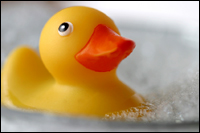Dear Umbra,
After a hot bath, I leave the water in the tub so the heat will go into the room. My husband says the heat saved is inconsequential. How would one calculate the BTUs saved this way?
J. Reiman
Helena, Mont.
Dearest J.,
I do that too. I’m trying to heat the entire office building with my baths, and I’ve been making my editor bring me my encyclopedias in the tub.

Ay, there’s the tub.
Roughly speaking (and cut me a little slack, you professional science geeks), a BTU, or British thermal unit, is the amount of energy needed to raise a pound of water 1 degree Fahrenheit; likewise, when a pound of water cools 1 degree, it releases one BTU. Since “a pint is a pound the world around” — even in Britain, home of the BTU — here’s what I suggest: measure the length, width, and height of the bath you usually take, multiply to get cubic inches, convert to gallons, then to pints. Then call those pints pounds (yes, I know, a pint of water actually weighs 1.04-ish pounds, but bear with me). For instance, my sources tell me a typical bath uses about 40 gallons of water, which is 320 pounds.
Then, with a thermometer of some kind — maybe a meat thermometer would work, or even a body thermometer — measure the temperature of the bath at the beginning (we’ll say 110 degrees), and the temperature before you drain the water (we’ll say 70 degrees). Now we collect the math ingredients and do a word problem. We lost 40 degrees of 320 pounds of water, which is 12,800 BTUS. Where did the BTUs go, and did they have an eventual impact on your home heating bill? Or perhaps the germane question is, what number of BTUs is “consequential”?
One truth known by we ersatz scientists is that perception is a large part of warmth. So 12,800 BTUs mistily roaming around the air near the bathroom will make you feel warmer, just as a hot kitchen will warm you — whether or not it affects when your furnace kicks in. The consequence to your heat bill is dependent on your type of heat, the draftiness of your home, and the location of your thermostat.
This may be a marital argument with no resolution, although I of course have two further suggestions. One is, before hubby reads this column, ask him how many bath BTUs he would consider “consequential,” then compare his answer to mine. Second is, aside from higher mold risk and drowning hazards, there can’t be much harm in letting the bath stand as it cools.
Logically,
Umbra
P.S.: Many thanks to those of you who wrote to tell me about hot-water-saving gadgets. More fodder for a future column!

